- Home
- Peter Swanson
Her Every Fear Page 9
Her Every Fear Read online
Page 9
“You could tell that from looking through a window?”
“No, I couldn’t tell that, obviously, but I thought that. I imagined that. Look, I do know it’s creepy. It is creepy. I guess I became a little obsessed with her.”
“In what way?”
“What do you mean?”
“In what way did you become obsessed, like what did you imagine might happen?”
Alan pressed his lips together, hard enough that they became colorless. He ran a finger along the rim of his glass. “I imagined that maybe we could meet and be together. That was it. I actually formed a plan that we could run into one another, but then she started seeing your cousin, Corbin.”
“Yeah, I heard that. From the friend.”
“He knew?”
“He did. Yeah. He said they were an on-and-off thing, and he sounded suspicious of him. I think he thinks Corbin has something to do with what happened.”
“What did this guy look like?”
“Who, Jack?”
“Yeah.”
Kate described him. His red, unkempt hair, the wiry frame, his flushed skin.
“I don’t know him,” Alan said. “I never saw him at Audrey’s place.”
Kate almost responded by saying that that hardly meant he wasn’t there, but she stopped herself. Something about Alan’s certainty made her realize that he really had been obsessed with Audrey, and had probably spent an enormous amount of time watching her through the window.
“It’s possible he didn’t spend time at her place,” Kate said.
“Yeah, it’s possible. I used to see Corbin there, though.”
“At Audrey’s place?”
“Yeah, that’s how I knew they were seeing each other. He used to be over there a lot.”
“How’d you know they weren’t just friends?”
“I saw them kissing a few times, I guess,” Alan said, clearly embarrassed.
“Did you know Corbin?”
“I did, a little,” Alan said. “I used to play racquetball with him. Not a lot, but a few times, and one of those times I asked him about Audrey, about whether he was seeing her, and he denied it. It was strange, at the time, because I’d seen them through the window, and knew that there was something between them. I just didn’t understand why he would deny it.”
“There could have been many reasons,” Kate said, having finally had a few bites of her chili, grown cold in the wide bowl. “Maybe he was seeing someone else at the same time, or maybe Audrey was. Who knows, maybe Corbin just thought you were being a nosy git and didn’t want to confide in you.”
Alan smiled his beautiful smile, so at odds with the gauntness of his face. “Probably that one,” he said.
“Which one? The nosy git?”
“Yeah, that one. I don’t know. I think I’ve just gotten paranoid. It seemed shifty at the time that he wouldn’t admit to seeing Audrey even though I knew he was.”
“So, you suspect Corbin, too? That’s what you’re saying?”
“When did he leave for London? Exactly?”
“That’s what Jack wanted to know. He took a night flight on Thursday night. I don’t know what time exactly, but he got to London early in the morning, so, in theory . . .”
“In theory he could have killed Audrey.”
“I suppose so.”
“And the police seem interested,” Alan said, then tilted his glass to get the last sip of his drink. “They searched your place—his place. What’s it like, anyway, his place?”
“Like something from a design magazine, but dated. It was his father’s apartment—that’s why he’s living there.”
“I didn’t know that.”
A waitress swung by to see if they needed anything else. Alan ordered another drink and Kate asked for a water. “My jet lag’s been terrible,” she said. “I’ve lost all sense of time since I’ve been here. I’m exhausted all afternoon and wide awake before dawn.”
“Quick. What time is it now?” Alan asked, a slight smile on his face.
“It feels like midnight, but I think it’s only around six.”
Alan pulled his phone out of his pocket and looked at its screen. “It’s just past six.” He put his phone down on the scarred wooden table and Kate noticed that his screen image was the purple and black movie poster from The Exorcist. It was one of her favorite films, but she didn’t say anything. She’d always loved horror movies, despite the traumas of her past and her own fervid imagination. They calmed her, in the same way that genuine apprehension calmed her. And they showed her that nightmares existed for other people, as well, even if those other people were fictional. Alan’s screen went to black, and Kate realized she’d been staring at it.
“I’m fading,” Kate said. “I think I’ll go back soon. I’m not trying to run away from you.”
“That’s okay if you are,” Alan said, and grinned. “I’d understand.”
“Why do you say that?”
“Because I just told you how I used to spy on my neighbor through my window and became obsessed with her.”
“No. I really am tired. And I wouldn’t judge anyone for being obsessive. I’ve been thinking about Audrey Marshall ever since I got here.”
“Because she was murdered in the apartment next to yours.”
“No, even before that. When I first heard she was missing, I knew something bad had happened. Well, I always think that—it’s my nature—but I was right this time.”
The waitress appeared with Alan’s drink and asked them if they wanted anything else. Kate asked for a check, then Alan did as well.
“Can I walk back with you?” Alan asked.
Kate pictured the long narrow street that led from the tavern back to the well-lighted busyness of Charles Street. Was Alan a murderer? He’d clearly been obsessed with Audrey. And from afar. But if he was, then why come to her and confess all that he’d confessed? Was it to get information? Find out what she knew?
“It’s totally fine if—” Alan started to say, as though reading Kate’s mind.
“No, we can walk back together. Sorry, I’m spacing out.”
After paying their separate checks, they exited onto the dark street, Alan leaving half his drink behind. The rain had stopped but the trees still dripped, and the sidewalk was covered with fallen magnolia blossoms, the air heavy with their cloying smell.
If we get to the end of this street, and Alan hasn’t strangled me, then he never will, Kate told herself. She began to count the steps silently to herself, but Alan said, as though reading her mind, “I had nothing to do with what happened to Audrey.”
“I know,” Kate said.
“Do you think I should go to the police and tell them what I know?”
“You mean, what you know about Corbin?”
“Yeah.”
“You should, probably, unless Corbin already told them. It’s not as though you have crucial information. You might just have information they already have. I’ll find out for you. I’m definitely e-mailing Corbin tonight. I was putting it off because I didn’t know whether he’d heard from the police yet or not.”
“You’ll let me know?”
“I will,” Kate said. They were halfway down the steep side street, Kate walking slowly in her boots because of the slipperiness of the fallen blossoms and the recent rain. She imagined herself falling, sliding onto Charles Street and getting crushed by some huge American SUV. But they made it all the way down and walked the rest of the way back to Bury Street. They talked some of the way, and Kate felt again the same ease with Alan that she’d felt the first time they’d met, as though they’d known each other for years and years. She reminded herself that she’d once felt the same thing for George Daniels.
They parted ways in the lobby of the building, Kate promising to let Alan know what she found out from Corbin.
“Come by my apartment and let me know. You know where I live.” He smiled, a little crookedly.
“Is your side the exact same as my side?”<
br />
“Exactly.” They said goodbye.
Sanders the cat was in the lobby, and he followed Kate up the stairs and down the hall to her door. She opened the door fractionally and placed her foot near the jamb to block him, but he quickly leapt over her foot and into her apartment. She entered and shut the door behind her. The cat was nowhere to be seen, but she decided to not worry about him; it was clear that he belonged to the entire apartment building.
She went straight to her laptop and opened her e-mail account. Corbin had written her:
Just heard about what happened from the police. I’m totally shocked. I didn’t know her that well, but I knew her, of course, a little bit. Do you know what happened? The police only told me that she was dead. Was it a suicide? And how are you doing? I’m sorry that your first few days in America have been stressful, and I understand if you want to come back. It must be scary to arrive in a new place and find out that your neighbor has died. Trust me, it’s a safe apartment building.
Not that it matters much, but I’m loving my time in London, and your flat is in good hands. Write to me with any news. Sorry, again. Corbin
Kate read it twice. Why would he deny that he had been involved with Audrey Marshall? Why didn’t he use her name?
Before writing him back, Kate looked through her other e-mails. Mostly junk, but there was one from Martha Lambert, who lived on the first floor of her building in London. When Kate had first moved in—nearly a year ago—Martha had immediately assigned herself the role of new best friend. Kate hadn’t minded, even though Martha’s sole interests were going to the pub and landing a man. When Kate moved to London she’d been determined to be a little bit social, and Martha, with her constant invites, had at least made that part easy. Her e-mail, not surprisingly, was about Corbin:
Miss you, Kate, but I am v pleased with your replacement. He’s gorgeous, as you know. You should have seen Michael’s jaw drop when he saw him down the pudding. He’s friendly, too, but I won’t go too much into that right now. How is it over there? What’s his flat like? Kisses, darling, I really do miss you. Martha
Kate opened up a reply window and stared at it for a minute, not knowing what to write. Should she warn her? Something moved in the periphery of her vision, and her heart stutter-stepped. It was Sanders, returning to the room from his tour of the premises. He sat back on his haunches and looked quizzically at Kate.
“He’s not here,” she said aloud.
To her surprise, Sanders answered back, a querulous meow.
She got up and went and opened the front door, and Sanders pranced off, brushing his tail against her leg on the way out. She shut the door and pressed her eye against the peephole to see where the cat went, but he was already gone from the hallway.
She returned to the e-mails. Should she tell Martha to be wary of Corbin? She should, of course, but she knew Martha well enough to know that it would totally fall on deaf ears. Instead she wrote:
Don’t you dare do anything in my bed, that’s all I ask. Boston is nice, and Corbin’s flat is bigger than mine. More later. Still jet-lagged. Kate
She didn’t want to say too much more about the flat. If Martha knew how rich Corbin was, her predatory instincts would become even more heightened.
Kate opened up a response box to Corbin, then paused. What should she tell him? She decided to tell him the basic truth, leaving out what she’d heard from Alan, leaving out Alan altogether. So she wrote him back, telling him that the police had asked to search his place and she’d agreed, and she mentioned the key. This information, at least, would give him a chance to let Kate know that he didn’t want the police in his apartment without a warrant. She hit send. It would be past midnight in London, and she wondered if Corbin was even up.
Before putting her laptop away, Kate searched for any new information on the death of Audrey Marshall. She found a story that indicated that the body removed from 101 Bury Street had been positively identified as Audrey Helen Marshall, and that her death was being treated as suspicious by the police.
Kate finally put her laptop away after clicking on several other news stories that all had the same, limited information. She went to the bedroom and got her datebook. Even though she knew that her first design class in Cambridge began the following day at one in the afternoon, she double-checked it. She’d already decided to leave early, give herself time to figure out the public transportation, and how to get to the school from the Porter Square T station. She sat on the edge of the bed, exhausted suddenly, but instead of leaning back, tucking herself up under the covers, and going to sleep, she grabbed the Dick Francis she’d started earlier, plus her well-worn copy of I Capture the Castle, a book she’d read many times.
She brought both of the books, plus the quilted comforter, across the expanse of the apartment to the leather couch in the den. She stretched out and opened the Dick Francis novel. She read one paragraph, then her eyes closed, the book still propped on her chest.
She was back in Audrey’s apartment, and Alan was there, crouched on the floor, his head tilted up and back, and looking at her. That’s not Alan, Kate thought. That must be George. But it was Alan. His fingers dug at the floor of Audrey’s apartment, as though he was trying to find something buried in the wood. He opened his mouth, and a cat’s meow came out. He dug some more, his nails making plucking sounds against the floor. Then he meowed again, louder, almost a keening sound. Kate woke with a jolt, both books sliding with the comforter to the floor.
Sanders was back in the apartment, scratching at the couch’s arm.
Chapter 12
Corbin Dell emerged from the taxicab into the cool air of late morning. It wasn’t raining but the atmosphere was damp, the sky low and white. Corbin hadn’t been to London since the spring semester of his junior year, which he’d spent at the Hutchinson School of Business and Economics, and because of that, he wasn’t sure how he’d feel arriving back in this haunted city. But he felt okay. Tired, because he’d only slept for about one hour during the flight from Boston to Dublin. He’d drunk some bad coffee during the lengthy layover and now he was jittery and slightly nauseous, his mouth coated with a bitter taste. The outside air was nice after the long ride from Heathrow.
The driver removed Corbin’s matching luggage from the cab and placed it on the sidewalk. Sheepscar Lane was long and gray, the sidewalks lined with pollarded trees. Workmen were fixing a portion of the road, and the air smelled sharply of warm tar. It was that smell, more than anything else, that brought London flooding back. As a student, Corbin had lived in Camden Town, also in North London, and that sticky, slightly sweet smell of tar had always been in the air. He’d forgotten all about it. He felt twenty years old again, walking back in a cold dawn from Claire’s flat on the other side of Regent’s Park, having finally lost his virginity. He had been happy, exhilarated almost, but the memory of it was painful, for so many reasons. Maybe he shouldn’t have come back after all, Corbin thought.
Kate’s flat was in a squat stone building with a patch of front garden large enough for one midsized bush. The trim was white, and the front door was painted a deep shade of blue, edged by small panes of glass. There were three mailboxes affixed to the inside of the entryway, and Corbin pulled the envelope from the box for apartment 2. He could feel the contours of the key inside. He slipped it out, opened the outside door, and hauled his giant Victorinox suitcase over the threshold into a narrow, high-ceilinged foyer. When the outside door rattled shut behind him, it was dark inside, even with the multiple small windows. Corbin found a switch; it turned on a hanging lamp that cast a yellow light. The floor of the foyer was covered in black and white linoleum and the walls were thickly painted in a light blue. He carried his luggage up the steep stairwell to the second-floor entrance and walked into the flat.
Kate had described the place in one of her e-mails, but the layout was still surprising. The exterior door opened into the bedroom, then a short stairway led to the bathroom, halfway up the stairs, while the
rest of the rooms, a kitchen and a bay-fronted living room, were located at the top of the stairs. There were windows overlooking the street from the living room, and windows down the stairs in the bedroom that looked out over a paved back patio, but that was it, since the building was attached on either side. It should have felt claustrophobic, but it didn’t to Corbin. It felt comforting, almost, and it was decorated, not in a feminine way, but in a way that seemed cozy. There were throw rugs in bright colors and large pillows on both the bed and the living room couch. The walls were painted white and hung with graphic prints.
Corbin used the bathroom, then unpacked all his clothes, putting them in an empty drawer that had been marked with a sticky note from Kate, indicating that it had been emptied for him. He thought of showering, but he was too tired. A low, throbbing headache was starting up in his temples, and his shoulders and neck were stiff from the flight. He swallowed four ibuprofens. The tap water was terrible, and he made a mental note to buy a case of bottled water as soon as possible. He stripped out of all his clothes but his boxer briefs and his T-shirt and stretched out on the living room couch with Kate’s long, handwritten letter. Annoyance flared up inside of him that she had taken time to write out a comprehensive guide to the neighborhood pubs and restaurants. He was only annoyed, though, because he hadn’t done something similar. Well, he could write her an e-mail and suggest some places. And he’d left her that bottle of champagne in the fridge—that would count for something. Besides, wait till she saw his place. She’d be impressed, he was sure of that.
Kate would be on the plane now, pocketed somewhere above the Atlantic. He tried to picture her, but had trouble. He’d only seen a couple of photographs of her before, both from a few years ago. One was a photo that his father had taken during a trip to England a year before he died. He’d gone over for a large family wedding. Corbin remembered that he’d tried to talk both Corbin and his brother, Philip, into coming. Philip never would have come because it would have disappointed their mother, and Philip would never do anything to disappoint her. Corbin hadn’t gone because of work. When Richard Dell returned, he’d printed the digital pictures he’d taken and cut them into the size of regular photographs to fit them into an album. Richard showed Corbin the book, pointing out myriad English relatives. That was when Corbin had first seen Kate, bracketed on either side by her father and her mother, Richard’s cousin. “My favorite cousin,” he told Corbin. “We were more like brother and sister, really, and this girl, this Kate, is the spitting image, the, the . . .”

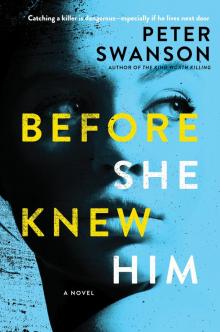 Before She Knew Him
Before She Knew Him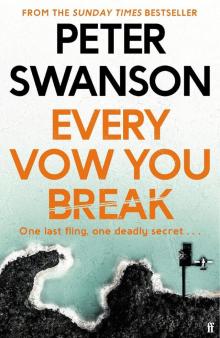 Every Vow You Break
Every Vow You Break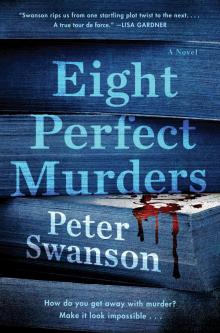 Eight Perfect Murders
Eight Perfect Murders Rules for Perfect Murders
Rules for Perfect Murders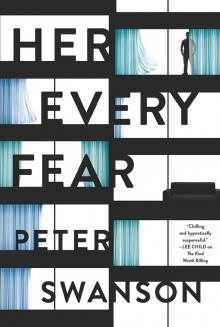 Her Every Fear
Her Every Fear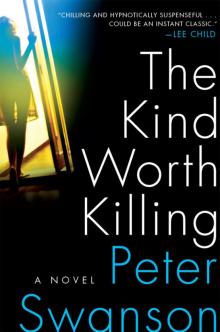 The Kind Worth Killing
The Kind Worth Killing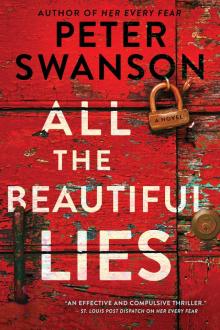 All the Beautiful Lies
All the Beautiful Lies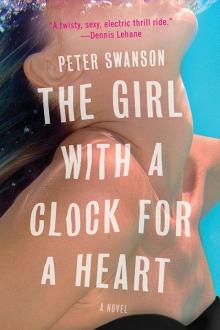 The Girl with a Clock for a Heart: A Novel
The Girl with a Clock for a Heart: A Novel